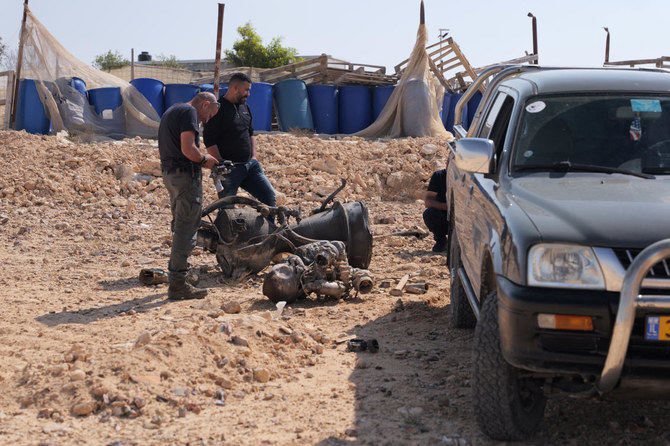JERUSALEM/DUBAI/WASHINGTON: Iran warned Israel and the United States on Sunday of a much larger response if there is any retaliation for its mass drone and missile attack on Israeli territory overnight, as Israel said “the campaign is not over yet.”
The threat of open warfare erupting between the arch Middle East foes and dragging in the United States has put the region on edge as Washington said America did not seek conflict with Iran but would not hesitate to protect its forces and Israel.
Iran launched the attack over a suspected Israeli strike on its consulate in Syria on April 1 that killed top Revolutionary Guards commanders and followed months of clashes between Israel and Iran’s regional allies, triggered by the war in Gaza.
However, the attack from hundreds of missiles and drones, mostly launched from inside Iran, caused only modest damage in Israel as most were shot down with the help of the US, Britain and Jordan.
An Air Force base in southern Israel was hit, but continued to operate as normal and a 7-year old child was seriously hurt by shrapnel. There were no other reports of serious damage.
“We intercepted, we repelled, together we shall win,” Israeli Prime Minister Benjamin Netanyahu said on social media ahead of a planned 1230 GMT meeting of the war cabinet to discuss a response to the attack.
Israeli Defense Minister Yoav Gallant said despite thwarting the attack, the military campaign was not over and “we must be prepared for every scenario.”
Israel’s Channel 12 TV cited an unnamed Israeli official overnight as saying there would be a “significant response” to the attack.
Iranian Foreign Minister Amir Abdollahian said Tehran had informed the United States its attack on Israel would be “limited” and for self defense.
He said Israel’s neighbors had also been informed of its planned strikes 72-hours in advance.
Global powers Russia, China, France and Germany as well as Arab states Egypt, Qatar and the United Arab Emirates urged restraint.
“We will do everything to stop a further escalation,” German Chancellor Olaf Scholz told reporters during a visit to China. “We can only warn everyone, especially Iran, against continuing this way.”
Turkiye also warned Iran it did not want further tension in the region.
The Islamic Republic’s mission to the United Nations said its actions were aimed at punishing “Israeli crimes,” but that it now “deemed the matter concluded.”
Iranian army chief of staff Major General Mohammad Bagheri warned on television that “our response will be much larger than tonight’s military action if Israel retaliates against Iran” and told Washington its bases could also be attacked if it helped Israel retaliate.
US President Joe Biden has pledged “ironclad” support for Israel against Iran, but did not announce any military response on Saturday night, saying instead he would coordinate a diplomatic response with other Western leaders.
The UN Security Council was set to meet at 4 p.m. ET (2000 GMT) on Sunday.
ESCALATION
Analysts debated how far Iran’s attack was calibrated to cause genuine devastation in Israel, or to save face at home after vows of revenge while avoiding a major new war.
“I think the Iranians took into consideration the fact that Israel has a very, very strong multi-layer anti-missile system and they probably took into consideration that there will not be too many casualties,” said Sima Shine, a former senior Mossad official at the Institute for National Security Studies in Tel Aviv.
But if Iran was hoping for a muted response, like with its missile attacks on US forces in Iraq after the killing of Guards commander Qassem Soleimani in 2020, she warned “I don’t think Israel sees it this way.”
On Saturday Iran’s Revolutionary Guards seized an Israel-linked cargo ship in the Strait of Hormuz, one of the world’s most important energy shipping routes, underscoring the risks to the world economy of a wider conflict.
Some flights were suspended in countries across the region and share prices fell in stock markets in Israel and Gulf states.
The war in Gaza, which Israel invaded after an attack by Iran-backed Hamas on Oct. 7, has spread to fronts with Iran-aligned groups in Lebanon, Syria, Yemen and Iraq.
Iran’s most powerful ally in the region, the Lebanese Shiite group Hezbollah fired rockets at an Israeli base overnight. Israel said it struck a Hezbollah site deep inside Lebanon on Sunday morning.
Yemen’s Houthis, who have been firing missiles at ships in the Red Sea in what they say is support for the Palestinians, called Iran’s attack legitimate.
The Oct. 7 attack in which 1,200 Israelis were killed and 253 taken hostage, along with internal discontent with the government and international pressure over the war in Gaza, form the backdrop to Netanyahu’s decisions over a response.
The Israeli prime minister has for years advocated a tough military line against Iran, pushing the United States for harder action over Tehran’s nuclear program and its backing for Hezbollah, Hamas and other groups in the region.
In Jerusalem on Sunday, Israelis described their fear during the attack, when sirens wailed and the night sky was shaken by blasts, but differed on how the country should respond.
“I think we’ve been given license to respond now. I mean it was a major attack from Iran... I imagine Israel will respond and may be over quickly and get back to normal life,” said Jeremy Smith, 60.
In Iran, state television showed small gatherings in several cities celebrating the attack, but in private some Iranians were worried about Israel’s response.
“Iran gave Netanyahu a golden opportunity to attack our country. But we, the people of Iran, will bear the brunt of this conflict,” said Shima, a 29-year-old nurse, from Tehran.
















